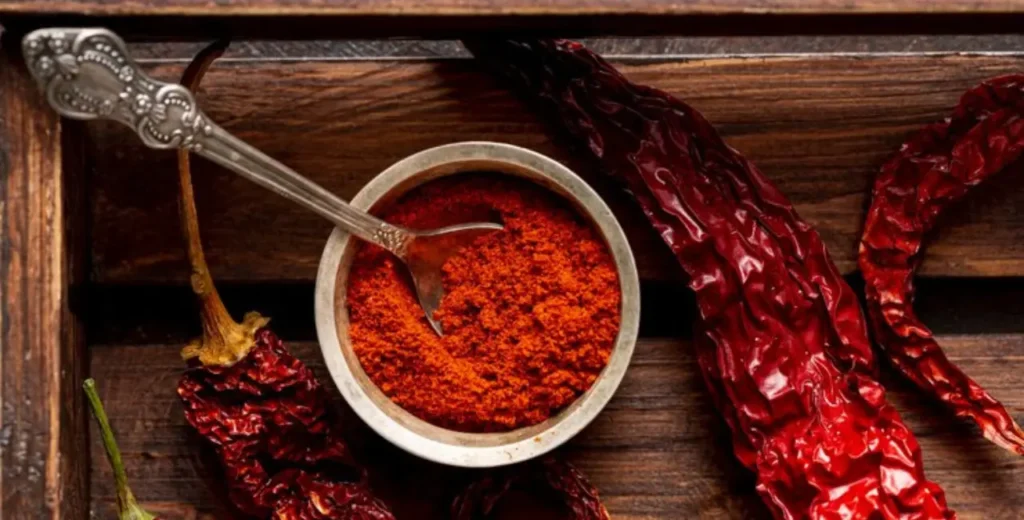Red chilli, with its fiery hue and tantalizing aroma, has long been a staple ingredient in cuisines around the world. Beyond its culinary allure, this spice offers a plethora of health benefits and intriguing uses. In this comprehensive guide, we delve into the multifaceted nature of red chilli, uncovering its various uses, health advantages, potential side effects, and answering frequently asked questions to provide you with a holistic understanding of this remarkable spice.
Understanding Red Chilli:
Red chilli, scientifically known as Capsicum annuum, belongs to the Solanaceae family and is widely cultivated for its fruit, which is commonly dried and ground into a powder to make the spice we are familiar with. The heat of red chilli peppers is primarily attributed to a compound called capsaicin, which is concentrated in the seeds and membranes.
Uses of Red Chilli:

- Culinary Delight: One of the most prevalent uses of red chilli is in cooking. It adds depth, flavor, and, of course, heat to a wide array of dishes, ranging from soups and stews to curries and marinades. Whether used fresh, dried, or powdered, red chilli enhances the taste profile of any cuisine it graces.
- Food Preservation: Historically, red chilli has been employed as a natural preservative due to its antimicrobial properties. In many cultures, it is used to pickle vegetables and meats, extending their shelf life while imparting a tangy spiciness.
- Natural Dye: The vibrant red hue of red chilli powder makes it a popular choice as a natural dye, particularly in the textile industry. From fabrics to cosmetics, red chilli extract is utilized to impart a rich, warm color.
- Gardening: Believe it or not, red chilli can serve as a natural pest repellent in gardens. Sprinkling dried chilli powder around plants or creating a homemade chilli spray can deter pests and protect delicate foliage without the need for harsh chemicals.
Health Benefits of Red Chilli:
- Pain Relief: Capsaicin, the active compound in red chilli peppers, has analgesic properties and is often used topically to alleviate muscle and joint pain. It works by desensitizing nerve receptors, providing temporary relief from discomfort.
- Metabolic Boost: Consuming red chilli peppers has been shown to increase metabolism and promote fat burning due to their thermogenic properties. Including red chilli in your diet may aid in weight management and improve metabolic health.
- Cardiovascular Health: Red chilli peppers contain compounds that help lower blood pressure and cholesterol levels, reducing the risk of heart disease and stroke. Regular consumption may contribute to a healthier cardiovascular system.
- Immune Support: Rich in vitamins A and C, red chilli peppers bolster the immune system, helping the body fend off infections and illnesses. Additionally, their anti-inflammatory properties may alleviate symptoms of certain autoimmune conditions.
Potential Side Effects of Red Chilli:
- Gastrointestinal Discomfort: For some individuals, consuming red chilli peppers in excess can lead to gastrointestinal issues such as heartburn, indigestion, and stomach ulcers. It is advisable to moderate intake, especially for those with sensitive stomachs.
- Skin Irritation: Direct contact with capsaicin can cause skin irritation, redness, and a burning sensation. Handling chilli peppers with bare hands or applying capsaicin-containing creams without proper precautions can result in discomfort.
- Allergic Reactions: While rare, allergic reactions to red chilli peppers can occur in susceptible individuals. Symptoms may include itching, swelling, hives, or, in severe cases, anaphylaxis. Those with known allergies to plants in the Solanaceae family should exercise caution.
FAQs:
Q: Can red chilli peppers help with weight loss?
A: Yes, the capsaicin in red chilli peppers has been shown to boost metabolism and promote fat burning, which may aid in weight loss when combined with a healthy diet and regular exercise.
Q: How spicy are red chilli peppers?
A: The heat of red chilli peppers can vary widely depending on factors such as variety, cultivation, and processing. Scoville Heat Units (SHU) are used to measure spiciness, with hotter varieties registering higher on the scale.
Q: Are there any medicinal uses for red chilli?
A: Yes, red chilli peppers have been used medicinally for centuries to alleviate pain, improve circulation, and support digestive health. Topical capsaicin creams are commonly used to relieve muscle and joint pain.
Q: Can consuming too much red chilli be harmful?
A: While moderate consumption of red chilli is generally safe for most people, excessive intake can lead to gastrointestinal discomfort, skin irritation, and allergic reactions in some individuals. It’s best to enjoy red chilli peppers in moderation.
Conclusion
In conclusion, red chilli is not merely a spice but a versatile ingredient with a plethora of uses and health benefits. From enhancing the flavor of culinary creations to providing relief from pain and boosting metabolism, its potential is vast. However, like any potent ingredient, moderation is key to reaping its rewards without adverse effects. Whether adding a kick to your favorite dish or exploring its therapeutic properties, red chilli remains a fascinating and invaluable component of our culinary and medicinal landscape.
Read More Blog: Wellhealthorganic.com || Wellhealthorganic.com